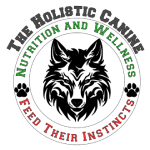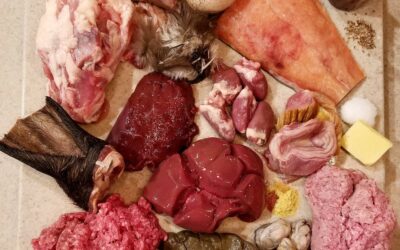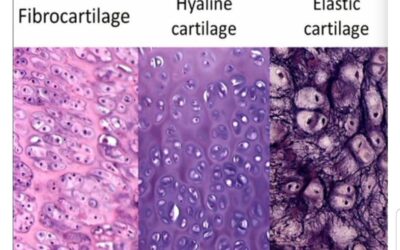Taking responsibility for your dog’s nutritional needs is a fundamental proactive step in the holistic health care approach. With this comes the need for educating yourself on your dog’s specific nutritional requirements so that you are able to provide the best possible meal plan that covers all vital nutrients. Once calorie/volume need and nutrient requirements have been determined, sourcing the appropriate foods and ingredients is crucial. This is often the most difficult task; and a task I hope to simplify in this article. Once you have chosen your foods and ingredients, knowing how much of each ingredient to feed is most easily determined using a spreadsheet calculator or Pet Diet Designer software. If those are not available to you, using the USDA Food Composition Database or Cronometer will allow you to do paper and pen calculations (with the help of a calculator!).
All dogs require high quality protein and fats. Carbohydrates are non-essential and therefore not recommended beyond a small percentage of the overall diet. Your dog must also receive vitamins and minerals from their meals in correct and varying proportions from foods that allow for optimal absorption and assimilation. These are vital. Species-appropriate ingredients allow for ease of digestibility for adequate breakdown to release nutrients for uptake. If the meals consistently contain nutrients in poorly managed proportions, antagonism will eventually create nutrient deficiencies or toxicities. If you are feeding inappropriate foods containing anti-nutrients, you will have even more antagonism and optimal absorption cannot be attained.
Protein and fats are the easiest to source. All meat, poultry, fish, eggs, offal, and organs contain both protein and fat. You will want your meals to revolve around these ingredients. Other sources include goat’s milk, cottage cheese, yogurt, spirulina, phytoplankton, wheat grass, and barley grass; however, these “other” foods should be used as supplementary over and above the minimum requirements.
Vitamins (The following lists are in descending order from richest sources to least richest sources)
Vitamin A:
- liver
- mackerel
- egg yolk
Vitamin D:
- salmon
- sardines
- herring
- oysters
- egg yolk
Vitamin E:
- sunflower seeds*, ground
- egg yolk (from chickens fed flax seeds)
- almonds*, ground (∆ contains oxalates)
- bone marrow
- trout
- avocado
- greens (∆ contains oxalates)
- kiwi, blackberries
- wheat germ oil
Vitamin K2 (menaquinone):
- beef liver
- pork
- chicken
- bone marrow
- fermented dairy: kefir, cottage cheese, yogurt
Vitamin K1 (phylloquinone):
- leafy greens, especially kale, mustard, chard, and collards (∆ contains oxalates)
- broccoli (∆ contains oxalates)
- cabbage (ideally fermented)
NOTE: Phylloquinone is less than 10% absorbed in humans; in dogs absorption is even less, if any. Source menaquinone vitamin K for optimal absorption.
Vitamin C:
- acerola cherries
- oranges
- papaya
- kiwi
- red bell pepper
- melon
- leafy greens (∆ contains oxalates)
- amalaki fruit
- broccoli (∆ contains oxalates)
Thiamine (B1):
- pork chops (lean)
- pork tenderloin (lean)
- salmon (wild-caught)
- flaxseeds* (ground)
- sunflower seeds* (ground)
- mussels
- asparagus
Riboflavin (B2):
- beef
- salmon (wild-caught)
- yogurt (low-fat)
- pork (lean)
- oysters
- spinach (∆ contains oxalates)
- cottage cheese (low-fat)
- eggs
- avocado
- asparagus
Niacin (B3):
- liver
- chicken breast
- turkey
- salmon (wild-caught)
- anchovies
- pork
- beef
- avocado
Pantothenic Acid (B5):
- chicken liver
- duck liver
- beef liver
- salmon (wild-caught)
- beef
- avocados
- chicken breast
- eggs
- sunflower seeds*
- pork (lean)
- cauliflower (∆ contains oxalates)
Pyridoxine (B6):
- salmon (wild-caught)
- turkey
- chicken breast
- pork (lean)
- beef (lean)
Biotin (B7):
- liver
- kidney
- pork (lean)
- egg yolk
- salmon (wild-caught)
Folate (B9):
- beef liver
- turkey liver
- pork liver
- pumpkin seeds* (ground)
- sunflower seeds* (ground)
- flaxseeds* (ground)
- asparagus
- spinach (∆ contains oxalates)
- broccoli (∆ contains oxalates)
Cobalamin (B12):
- liver
- mackerel
- oysters
- mussels
- beef (lean)
Choline:
- egg yolk
- beef liver
- turkey liver
- veal
- beef
- pork
Minerals (The following lists are in descending order from richest sources to least richest sources)
Calcium:
- bone
- bone meal
- eggshells
Phosphorus:
- bone (and bone meal)
- salmon (wild-caught)
- pork (lean)
- mackerel
- chicken
- beef
Magnesium:
- hemp seeds* (ground)
- pumpkin seeds* (ground)
- flaxseeds* (ground)
- bone
- spinach (∆ contains oxalates)
- chard (∆ contains oxalates)
- mackerel
- chlorella (dried)
- almonds (ground)
- avocado
- beef
Potassium:
- salmon (wild-caught)
- avocado
- acorn squash (cooked)
- pomegranate
- goat milk
- yogurt, low-fat
- pork
- bone
Sodium:
- canned sardines (also contains essential chloride)
- canned oysters (and contains essential chloride)
- Himalayan pink salt
- blood
- bone
Sulfur:
- eggs
- meat
- poultry
- fish
- bone
Iron:
- blood and bone marrow
- liver
- heart
- gizzard
- beef
- turkey (dark meat)
- egg yolk
Zinc:
- oysters
- beef
- chicken gizzard
- chicken heart
- chicken thigh and drums
- pork
- hemp seeds* (ground)
- pumpkin seeds* (ground)
- bone marrow
Copper:
- beef liver (calf especially)
- oysters
- pumpkin seeds* (ground)
- flaxseeds* (ground)
- kale (∆ contains oxalates)
Manganese:
- mussels (green lipped)
- hemp seeds* (ground)
- pumpkin seeds* (ground)
- pineapple (RICH source, but feed as treat)
- sweet potato (cooked ONLY)
- spinach (∆ contains oxalates)
- ginger, basil
- blackberries, raspberries
- endive
- bone marrow
Selenium:
- oysters
- pork kidney
- mussels
- beef kidney
- pork
- pork spleen
- bone marrow
Iodine:
- kelp (do NOT overdose!)
- seaweed
Molybdenum:
- liver
- kidney
- bone
- almonds* (ground)
- yogurt
- cottage cheese
Silica:
- bone
- connective tissue
- diatomaceous earth (DE) (food-grade only!)
∆ Foods containing oxalates can pose major health concerns. Dogs are carnivores, and despite the fact that they are facultative, consuming large amounts of plant matter is not species-appropriate. Relying heavily upon spinach, kale, and other oxalate-containing vegetables is detrimental and potentially injurious to a carnivore (and people! So imagine how much worse for a carnivore!). Oxalates reduce the gut absorption of calcium and iron as well as greatly increasing the risk for kidney stone formation and renal damage. Oxalates are also neurotoxic, corrode connective tissues, and upset the gastrointestinal tract. Please note that cooking will not destroy oxalates. Even boiling the vegetables to a mush will only slightly reduce the oxalates. Oxalates are used by paleontologists to determine diets in humans from more than a millennium past. So clearly, oxalates are not easily destroyed.
*Seeds and nuts (as well as grains and legumes. As a side-note, I never recommend grains and legumes be fed to a dog for many reasons including phytates, enzyme inhibitors, lectins, toxins, carbohydrates, and the need to pressure cook until mush, among others.) contain the anti-nutrient phytate. Like oxalates, phytates block the gut absorption of vital nutrients. However, unlike oxalates, phytates can be counteracted by adding foods rich in vitamin C or a food-source vitamin C powder which I highly recommend to all my clients who regularly include seeds in their dog’s meals. This is a simple correction to amplify the mineral-rich benefits of seeds.
©2019 Kimberly Lloyd, PhD, BCHHP, Cert Raw Dog Food Nutritionist



